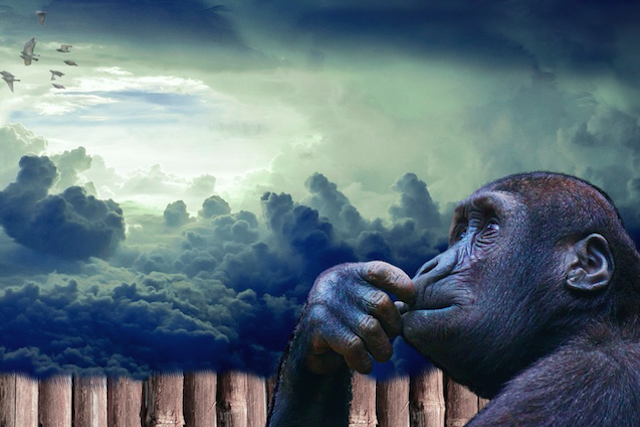
“Explanation separates us from astonishment, which is the only gateway to the incomprehensible.” ~Eugene Ionesco
We are taught from a very young age that it is our responsibility to reflect on the motives behind our actions and behaviors. From the time we can form sentences, we are asked the questions: “Why did you make that choice?” and “What made you do that?”
These questions often follow bad behavior and punishment. Our parents were trying to teach us, with the best of intentions, that we are responsible for our own actions.
This is a necessary lesson for young children, who are discovering their autonomy and the consequences of their behavior in a social world.
To a certain point, we should be held responsible for our actions, by others and ourselves. A conscientious person practices self-reflection and recognizes the origin and causes of thoughts and feelings when possible.
But for some of us, myself included, it feels like every thought and behavior needs to be analyzed.
Self-reflection, rumination, and justification fill my day and keep me up late at night. In order to maintain a sense of self-control and discipline, I dissect every emotion I feel and every action I take, all the while building a psychological narrative for my life.
For a long time, my drive to understand my behavior was an asset. I could explain my actions and thoughts more maturely than other kids, and adults prided me on my reflective nature.
When I was younger, I was blessed with mental health. Because my mind was functioning correctly and promoting the right behaviors and feelings, it was easy for me to explain and justify my actions. For the most part, they were appropriate and positive.
If I did act slightly out of line or overreact to a situation, I could assemble a psychological justification for it. Whether I dipped into parental relationships, miniature traumas from kindergarten, or a mere misunderstanding, I always managed to justify my behavior with sound psychological reasoning.
I thought of myself as my own personal therapist, totally capable of unearthing the intricate details of my inner psyche.
I perceived myself to be in total control of my feelings and my life. My brain was subject to my willpower. Most importantly, I was never at a loss when asked the question: “Why did you do that?”
The summer after I turned sixteen, my mental health began to unravel. I began to use my copious willpower and self-control to lose some weight and increase my fitness level.
At first, I did have control of my weight loss, and my brain’s intentions lined up with my conscious goals. I looked great, I felt great, and I hadn’t faltered a single day in my diet and exercise routine.
Then, some time in August, my weight-loss spiraled out of control. I became more restrictive and ramped up my exercise. My behavior, once a matter of conscious decision, was inexplicable to me. The thoughts in my head, centered on weight loss and extreme exercise, were loud and unintelligible to me.
For a while, I kept these thoughts quiet, telling myself that I would soon get control of my brain. I didn’t want to admit to myself or others that I had lost control of my thoughts and feelings.
I felt weak and stupid because I couldn’t understand my own behavior, and I felt the need to punish myself for failing to comprehend my mental state. Unfortunately, the easiest way for me to punish myself was to lose more weight and push myself even harder in my exercise.
My parents and other adults in my life did notice that I was losing weight, and asked me what was going on.
I cycled through faulty lines of logic—school stress, loneliness, a desire to be “healthy” taken too far—but I knew that none of these explanations was entirely correct. I would tell those around me that I had finally figured out the true root of my restrictive eating, only to continue the next day.
Nearly a year after this began, one of my favorite teachers suggested that we have a talk about my mental health. I told him about the craziness of the past year, and came clean with the fact that I didn’t understand my own mind anymore. I apologized profusely, waiting for him to question me about my social, emotional, and academic life to find answers.
Instead, he told me something I will never forget:
“Avery, you don’t have to understand. No one can really understand everything that they say or do. We aren’t supposed to figure everything out, because life is messy and not everything can be analyzed and justified. Some things are just incomprehensible.”
Some things are just incomprehensible. Hearing this lifted a huge weight from my shoulders. It was okay to rest in a state of unknowing, to breathe, even in the midst of confusion.
After this conversation, I was finally able to accept that my brain is only partially open to my conscious analysis. I can justify some of my actions, but sometimes I will feel or think certain things that can’t be rationally explained. I realized that I am allowed to understand only a fraction of what it means to be human.
In lieu of our talk, I stopped trying to justify my behavior, and instead focused on what I could control: my reaction to my thoughts and feelings. When thoughts enter my head, I can decide how to respond to them, even if I can’t understand where they came from or why they are surfacing in the moment.
Paradoxically, accepting that I do not and cannot justify all of my thoughts and behaviors has been the single most important step in recovering my weight and my mental health.
I no longer need to punish myself for failing to understand. I can love myself without absolutely knowing myself, just the way I love others without understanding their every thought and action.
At first, when talking to my family and friends, I expected them to be disappointed in me when I confessed that I couldn’t make sense of my feelings and behavior. Amazingly, the opposite happened: People felt closer to me than ever before, and found me more relatable because I too struggled to understand myself.
The truth is, none of us will ever fully grasp the origin and cause of our every thought, feeling, and action. Neurologically speaking, we actually aren’t supposed to; scientists now know that we can only infer and predict many of our actions, just as we predict the actions of others based on limited information.
Letting go of our constant self-analysis and rationalization is scary at first for people like me, who take pride in self-control and reflection.
However, by accepting that you cannot know or explain your whole self, you liberate yourself from the constant burden of rumination. You are free to control what you can control—your reactions to thoughts—and to let the rest come and go.
Next time you ask yourself, or someone asks you, “Why did you do that?” you have the right to say, “I don’t know” if the answer truly eludes you.
Of course, in some situations, it will be necessary to get to the root of a problem, especially when dealing with relationships. Even so, you have the right to not know yet; some feelings and habits can only be understood with time and distance.
It’s okay to tell others that you need time and space to process your thoughts, and that, for the time being, you cannot offer a succinct explanation.
They say that the only thing as complicated as the universe is the human brain. Both are chaotic, awe-inspiring, rife with contradictions, and impossible to fully comprehend. That is what makes them, and, by extension, life, so exciting and beautiful.
About Avery Rogers
Avery Rogers is a high school student in California. She aspires to be an author, spiritual writer, and neuroscientist when she grows up. She is the creator and host of the Brainstorms Podcast, a neuroscience podcast for teenagers. She also runs a personal blog about love, spirituality, and the meaning of life at on her blog Pluto’s Journal.













 Though I run this site, it is not mine. It's ours. It's not about me. It's about us. Your stories and your wisdom are just as meaningful as mine.
Though I run this site, it is not mine. It's ours. It's not about me. It's about us. Your stories and your wisdom are just as meaningful as mine.
You are an amazing writer. I absolutely loved the way you explained this so well, I understood completely. So helpful. Thank-you. 🙂
Thank you so much! I’m glad it was easy for you to relate to.
This is an amazing article by a high school teenager. Thank you. Very helpful!
Thank you so much, and you’re so welcome!
This is exactly what I’ve been going through so it’s nice to read from
someone that I can relate to. I used to compete in bodybuilding shows and I am
also too analytical with my thoughts.. my shows spiraled to restricting and loss
of self-control as well. I’m in the process of trying to balance out what I don’t
understand and being okay with that too. This was helpful! Thanks for sharing.
Though I’ve never been involved in an activity that focused on my body, I can certainly relate to the spiraling thoughts related to diet and body. It’s a very slippery slope, and I’m glad you’re learning to find balance again. Balance is key, I’ve found- it’s unhealthy to take certain behaviors too far, but they can be healthy in moderation and with awareness. You’re welcome!
I found this post fascinating and amazing – actually I didn’t even realize that I was programmed to do this from a very young age. It has cost me inner peace and a sense of well being as I have also thought I was doing something “wrong”. And then to find these words from a high school student with so much wisdom! Thank you…
Exactly! The idea of constant self-analysis and judgment is so built into us that it becomes completely unconscious. Until my teacher told me that I could decide not to analyze, I didn’t know it was even a possibility. You’re so welcome! Thanks for your kind words!
Thank you Avery, this was wondeful to read and helped me relax. Thank you for being so open and sharing your personal experiences.
Of course!
this is so true for me..its exactly what I keep doing ..analysing and justifying myself and others ..it felt great that its ok to not really do that..and that its ok to have done that too..we are all so human..thanks a lot for this one
You’re very welcome! I felt exactly the same way when I realized that analyzing my behavior constantly is unnecessary- intense and beautiful liberation. Thank you for your comment!
After 38 years I have finally stopped trying to control my thoughts. I now just let them be. As you said in this article, the trick is not to identify with your thoughts. Just let them come and go. Such an important discussion for our younger generations. Thanks for sharing Avery Rogers.
I’m so glad to hear that you’ve realized how to live a more peaceful and less controlling life! Thank you for sharing!
Thank you so much Avery for sharing your thoughts on such a Big mental pain, I have a identical story like yours, I too have a healthy mental conditions and control until I became 15 and now at 24 I am still facing the issues and problems of self analysis and being a judge of every thought produced in mind. But a constant effort to avoid such behavior I have found reading blogs like tinybuddha and some others as well, this actually helps a lot, it gives courage and patience that we should not fight with the thoughts but simply let go the thoughts and illusions that creating chaos. Thanks a lot and keep reading keep writing and sharing your valuable thoughts
I’m sorry to hear that you’ve been having this issue for quite some time. I truly believe that adolescence triggers a lot of these feelings in a deeper way, and it can be hard to escape once it has started. I’m glad that Tiny Buddha and other blogs have helped you as they’ve helped me. Thank you for commenting and I wish you the very best in your journey forward.
This is something exactly happening with me and I have been battling with this since last two years.But after reading this I am feeling really really good and could know that I am not the only one who is experiencing this dilemma.I really want to say Thank You.This seems like my mental situation.
I’m sorry to hear you’ve been struggling, but I’m glad I could provide you with the knowledge that you aren’t alone. Keep pushing through, and know that you deserve peace. Thank you for commenting!
I knew I was over analyzing myself to a painful degree but could not put it in to words… Thank you for doing such a great job at it! So very helpful and exactly what I needed to hear to start my day. Its comforting to know that others suffer from the same issue. Wonderful job and thank you <3
Thank you very much, and you’re so very welcome. I’m glad I could help to articulate your feelings!
Thanks for sharing this wisdom Avery. Sometimes we can try to be too smart for our own good 🙂 A need to comprehend everything can lead to frustration. Our greater need is to find fun, fulfilment and love. Thanks for reminding us that we need to accept that somethings are incomprehensible. All the best Avery, you clearly are an amazing young woman xx
“Too smart for our own good”- I couldn’t agree more! It is incredible to think back on the days when I was a younger child, arguably less intelligent and “enlightened” than I am now, but at the same time so full of peace and present attention. We accumulate the burden of analysis as we become smarter and more knowledgeable. Thank you very much!!
This is amazing, and it’s beautifully written. Thanks for sharing your story, as I experienced something very similar to me some years ago and am healthfully practicing embracing the uncertainty of life – both within and outside of myself. It’s certainly not easy though, especially in a fast-paced culture looking to find the answers to nearly everything as a means to understand it. I hope you continue to share your story and experiences, as it is a wonderful way to connect and grow.
Thank you so much! I’m glad you are learning to embrace uncertainty. If you’re interested in the junction of uncertainty and philosophy, I highly recommend Ancient Chinese philosophy, especially the teachings of Mencius. His philosophy revolved around the utter lack of certainty in life, and how we can prosper in accepting uncertainty. I agree that the fast-pace of culture makes us even more pressed to come up with a quick answer for everything, before we even have a chance to consider if an answer can be reached! Thank you again!
Excellent dissertation! Very articulate and insightful. Bravo!
Thank you!
Good Article. Thanks for sharing!
Thanks!
Wow! I read tinybuddha quite a bit and sometimes I can’t help but think this article is bunk, sometimes I see the truth even if I don’t agree ..and sometimes I’m amazed at the ability of a writer to express themselves so succinctly and with such wisdom. Great article!
Thank you so much! I’m glad the article felt truthful to you.
Liked the post. In my opinion, love and support of family/friends can help reduce this habit of frequent self analysis. If we are encouraged for our confidence and decision making, then we don’t think too much every time for every thought.
I completely agree. Having loved ones affirm our decisions and actions, even the ones we cannot explain, can have tremendous benefits to our mental health and ability to live with the unknown. Thanks for sharing!
Hi Avery, thank you for your post. This resonates with me so much because I’m so introspective that I become disconnected from the outside world. Very insightful. Especially like that part where you said we don’t have to understand everything.
Thank you Amy! I’m a very introspective person too, and it certainly comes with positives and negatives. I’m glad you enjoyed the post!
I have been doing this for 18 years after a bad acid trip . I disect every little detail and I do this when Im in social environments and I struggle to relax and live in the moment when Im with friends or alone. I think that this wouldnt be such a bad thing if it didnt consume most of my time. And wow, I just realized this post is old af lol.
Well said. I am currently struggling with trying to understand my own self and in turn feeling pretty low. I can understand what it means to try to always understand why you feel a certain way and then fix the “root cause”. ‘
I’m sorry that you’re struggling. I get into the same low moods, where I get down on myself for not understanding my behavior and not acting rationally all the time. The “root cause” is interesting because we spend so much time trying to find it, but often get stuck in the process and feel even worse. Thanks for commenting!
Hi Avery! this article was just great, thanks for sharing. It feels like you write it for me just in the moment i need it 🙂 thanks again.
Pd: i think it is the first time i comment an article (eventough i read a lot!)
I am 40 years old and i learned a lot from this article. For a high school student you are wise beyond your years. Thank you for this article!
Thank you. This article really helped me realize that 1. I’m not crazy 2. I’m not worthless or dumb 3. I’m not alone. My recent need to overalynize conversations and have utter control over myself and my relationships stems from being diagnosed with cancer and the fact I have no control over my fate when it deals with this disease.
I’ve suffered a lot with this but have never really opened up about it – hard to articulate.
Your article really provided some relief and understanding that I’m not the only one going through this. Working really hard on staying in the present and putting focus on external rather then internal factors.
I struggle with introspection so much, I feel like I constantly have to psychoanalyze myself, and it happens on autopilot sometimes, without me even realizing it, and it’s exhausting, reading that had certainly made me feel less alone, thanks for your insights on the matter!
It took me a lot of time to figure out what my problem was, well it was exactly what this article is about. Thank you so much for writing this it helped me so much, I truly feel a hundred times better. Thank you once again! 🙂
Exactly what I needed to hear… created an account just so that I could comment lol. Feels like I’ve been battling with this my whole life but it got bad about 6 years ago ( I am now 19) and I could not until recently understand how terribly introspection was affecting my life and just really making me disengage from everything but my own little world. Glad that I am now aware and hopefully going to try to control it better. But your article really spoke to me, thank you!
This meant a lot to me. (I never usually comment on these)
I have social anxiety and struggle with comfort eating as a coping mechanism with it, leading to body image issues. Been dealing with this for a lot of my young adult life – I’m 20 now.
I am at university and along with growing up & going to university I’ve become more and more self inquisitive. I’ve always wanted to self-analyse and understand the way I am; I even try analysing other people and when I’m watching TV shows and films it’ll make me relate it to my own life and analyse more, in minute detail, about my own thoughts and feelings.
Thisfeels productive, but I’ve realised it’s only productive when it brings about some sort of productive action from it, not just endless analysing which is basically impossible because the brain is so complex and has its own subconscious etc etc. But basically I’ve fallen into this self-analysis trap recently, especially during quarantine due to COVID-19, more time with your thoughts.
I’ve realised that it isn’t helpful to always psychoanalyse myself; not everything has to be understood. Going to try some meditation and also just being in touch with my mind-body connection. Embracing my feelings and letting go of the need to always be cognitively analysing what I’m doing.
Love and peace to everyone. xxx
Ok, I’ve read this and let me say something. What you did was not completely objective analysis. As you said yourself, you were trying to constantly “justify” yourself and your own actions. And you also wanted to believe that you knew everything.
You were very logic based, but didn’t recognise the subconscious bias that was present. When trying to analyse every bit of action, you shouldn’t do it expecting you’ll figure literally everything out. That’s unrealistic. You also shouldn’t get ahead of yourself and think you already know the explanations of everything in your mind.
But since you have done this, you were unable to keep things in control. Rather than making rational analysis, you eventually turned to making analysis mixed in with wishful thinking and hope. When the two come together, you can easily fall into the trap of wishfully thinking that you do have control, while you actually don’t. But since things don’t add up, you get confused and everything becomes mixed up.
Rather than learning that you were subliminally biased, you decided to quit learning further because of something someone said. I recommend you to continue analysing things in your daily life. Not just about your own thoughts, but also about others.
When it gets too annoying, you don’t have to continue thinking. But it’s a very good method of improving your critical thinking, analysis ability and understanding of the human mind. You start to understand more and more about things in the world, as well as how society works.
We need more people like this. We need more people that understand how things work. Because we have a lack of people with great understanding, we now have a bunch of controversial subjects that resulted from failed studies and research.
In order to improve yourself and the world, we all need to start being critical about everything. And we all have to analyse and learn as many things as possible. If people started doing this more often, problems in society could be solved much sooner.
This is exactly what I have been going through for the past 2 years and while reading this blog, each and every word resonated with me to the core. I am a psychology student so this extreme form of critical analysis felt very “natural” to me but experiences from past two years dictate the opposite. Anyway, this whole piece of writing was an eye opener. I loved it. Thanks to the writer! 💕